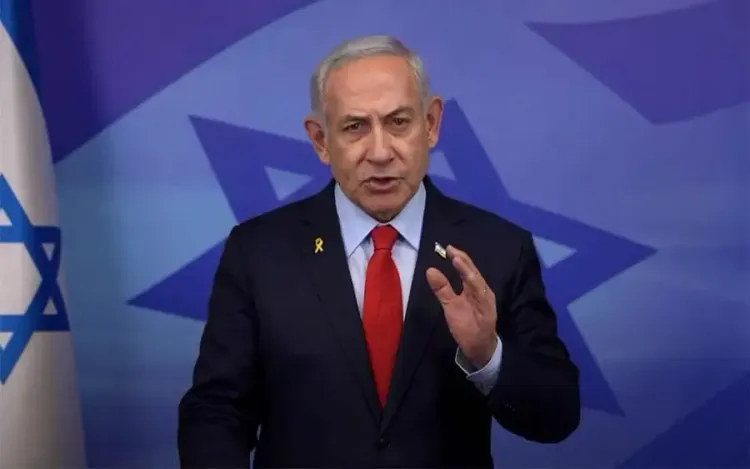Netanyahu Affirms Israel's Right to Resume Conflict if Gaza Ceasefire Agreement with Hamas Fails

Synopsis
Key Takeaways
- Netanyahu asserts Israel's right to resume fighting if ceasefire fails.
- US support is confirmed for Israel's military actions.
- Three fundamental principles guided the ceasefire negotiations.
Tel Aviv, Jan 19 (NationPress) Israeli Prime Minister Benjamin Netanyahu has declared that Israel maintains the right to resume military action against Hamas if the ceasefire-for-hostages agreement fails -- and that it would have the support of the United States in such a scenario.
In a televised statement just hours before the ceasefire is scheduled to commence on Sunday morning, Netanyahu commended the agreement, attributing its success in part to the outgoing administration of President Joe Biden and the incoming administration of President-elect Donald Trump.
Facing increasing political pressure regarding the deal in Israel, the Prime Minister pledged to "achieve all the objectives of the conflict and ensure the safe return of all individuals."
"This agreement is primarily the outcome of the bravery displayed by our fighters on the battlefield, as well as our unwavering commitment to Israel's essential interests. We have stood firm against significant pressures from both domestic and international sources," Netanyahu stated.
He urged Hamas to adhere to the stipulations of the agreement.
Netanyahu mentioned that both Biden and Trump had consented to uphold Israel's "right to resume hostilities" should Hamas fail to comply with the terms of the deal.
"I am profoundly grateful for that," he said.
"If we must return to military action, we will do so in innovative ways, and we will execute it with considerable force," Netanyahu affirmed.
He indicated that he adhered to three "fundamental principles" throughout the negotiations that culminated in the ceasefire-for-hostages accord with Hamas.
Firstly, he stated in a televised address on Saturday, was Israel's right to engage in warfare, with US backing, if discussions regarding the second phase of the agreement collapse.
Secondly, Netanyahu asserted that he advocated for a "substantial increase" in the number of living hostages to be released in the initial stage of the deal. He claimed to have "nearly doubled" that figure since negotiations began in May, though he did not provide specifics.
Thirty-three hostages are anticipated to be freed by Hamas during the first phase of the agreement, but it remains uncertain how many of these individuals are alive. Historically, Israel has counted both living and deceased hostages whose remains have not yet returned to Israel in its official hostage statistics.
The third principle, according to Netanyahu, was that Israel would retain full control over the Philadelphi Corridor -- the narrow strip of land along the Gaza-Egypt border -- and the security buffer surrounding the entire Gaza Strip.
Israel's ongoing military presence in the Philadelphi Corridor had previously posed challenges in negotiations, but Netanyahu stated on Saturday that, "contrary to all the external reports I receive," Israel was "not only maintaining its forces there -- we are even slightly augmenting them."
Netanyahu emphasized that the first phase, lasting 42 days, was a "temporary ceasefire."
"Should we be compelled to resume military operations, we will do so with vigor," the Israeli PM asserted, noting that Israel has "transformed the landscape of the Middle East" since the conflict began.
The cessation of 15 months of warfare signifies a move towards concluding the deadliest and most damaging conflict ever between Israel and the Hamas militant organization — and follows more than a year since the last ceasefire was achieved.
The ceasefire is set to take effect on Sunday at 8:30 am local time, as announced by mediator Qatar on Saturday.
Both parties have indicated that a hostage-for-prisoners exchange will be contingent upon an announcement after 4 p.m., as families of captives held in Gaza awaited updates on their loved ones, while Palestinians readied to welcome released detainees and humanitarian organizations hurried to mobilize aid.
Earlier, Netanyahu insisted that Hamas provide a list of names of the hostages to be released on Sunday prior to executing any prisoner swap.
"We cannot proceed with the framework until we receive the list of hostages designated for release, as previously agreed," his office stated.
This declaration came nearly three hours after Israel anticipated receiving the names, which Hamas was supposed to provide to mediator Qatar. There was no immediate feedback from either Hamas or Qatar.









